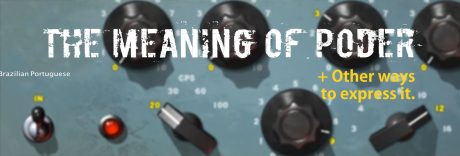Are you getting sick of my posts that just deal with a verb? It's not for lack of other subjects; it's just that VERBS ARE KEY to building sentences and fluency. Verbs are also handled very differently in Portuguese than in English. We use phrasal-verbs extensively: get-over, get-going, get-ahead, get-away and on, and on, and on. It's much simpler in Portuguese. There is a specific verb for almost everything ➜ ➜ no_phrasal_verbs! Nada. I know first-hand from my Brazilian wife that learning even some of our phrasal verbs is nothing less than um pesadelo. We don't even think about it ~ but do you say call up, call out, call back, or call off? Is it check-in, check-out, check-on, or check-off? PE-SA-DEL-O. CONSEGUIR in Portuguese is one of those verbs that can, for example, be used in place of PODER to create a more precise, nuanced meaning than poder can.
CONSEGUIR in Portuguese
This is a key verb. Brazilians use it all_the_time.
Use it to express to get, to succeed in (an objective).
It's confusing because there are other verbs for expressing these ideas. So, let's get specific.
Let's let the examples show you:
*You could also leave out the um ➜ Você conseguiu emprego. ➜ You got some work.
Conseguiu entender?
Hey! You may be noticing that there are other ways to say these examples above. And, that is almost always the case. Language is flexible. But imagine for a moment that instead of saying, "Conseguiu entender?" we'd said, "Pôde entender?" This would mean, Could you understand?, and with CONSEGUIR it translates as, Were you able to understand? Knowing lots of Portuguese verbs is one the keys to fluency.

 PODER in Portuguese
PODER in Portuguese  the Meaning of PODER + better ways to say the same thing.
the Meaning of PODER + better ways to say the same thing.
Comentários